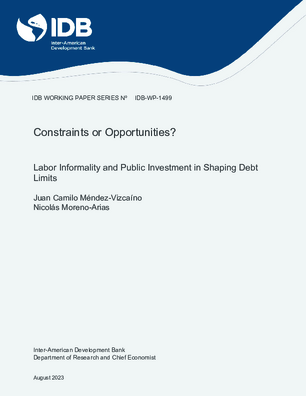Constraints or Opportunities?: Labor Informality and Public Investment in Shaping Debt Limits
Date
Aug 2023
This paper presents a comprehensive framework examining fiscal sustainability in developing economies. It integrates public capital, labor informality, and global liquidity shocks in a two-sector DSGE model for a small open economy, revealing their intricate interplay and nonlinear impact on State-Dependent Debt Limits. The framework highlights the significance of initial public capital levels and efficiency in determining the benefits of public investment. High informality rates erode the tax base, compromising the efficiency of public capital for fiscal purposes by weakening revenue generation relative to costs. Adverse global liquidity shocks may significantly contract the fiscal limit distribution only if they are perceived as permanent. Through model calibration and sensitivity exercises on Colombia's fiscal limit distribution, quantitative analyses shed light on underlying mechanisms. Findings challenge the frequent practice of cutting public investment in response to declining revenues, emphasizing it can actually reduce fiscal space. The framework underscores the importance of assessing fiscal policy consolidations aimed at ensuring debt sustainability and responses to global shocks using a structural model, while stressing the fiscal benefits of informality-reducing reforms.




